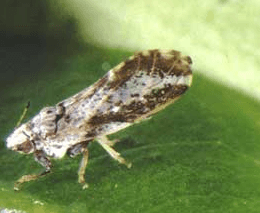Scientists turning to Pakistani insect predator to try and save California citrus industry
The Asian Citrus Psyllid spreads a disease that kills citrus trees. Scientists in California are trying to halt its spread. (Courtesy of the University of Florida Institute of Food and Agricultural Sciences.)
Florida’s citrus industry has been devastated by the Asian Citrus Psyllid, an invasive insect that spreads a disease that kills citrus trees.
Scientists are turning to the tiny Tamarixia Radiata, an Asian Citrus Psyllid predator from Pakistan, to try and prevent the same fate from spreading to California’s citrus growing regions.
Mark Hoddle, entomologist and director of the Center for Invasive Species Research at the University of California, Riverside, said the female radiata lays an egg on immature psyllid nymphs, which then hatch and eat the immature nymphs. They can also kill the psyllid by feeding directly on the nymphs.
The idea is to get the radiata to kill the psyllid before it takes out California’s orange crop. Of course there are valid concerns with bringing a non-native predator to the United States.
“We’ve working in Pakistan for the last 18 months. Once we found these parasitoids, we brought them back to a biosecurity level 3 quarantine facility on the campus at University of California, Riverside. For the last 16 months, we’ve done an intensive battery of safety tests.”
The tests, Hoddle said, involved introducing the radiata to other insects, non-harmful native species, that radiata may encounter in the wild. The tests found the radiata had no interest in eating or using any other species for reproduction. There was no evidence the predator would attack other insects, pets or humans, Hoddle said.
But there’s a larger problem. Invasive species are quickly becoming more common in the United States. Hoddle said it’s estimated that California acquires a new species every 60 days. In Hawaii and Florida it happens even faster.
“The cost to the U.S. is exceptionally high from these invasive species. Some estimates put it as great as $138 billion a year,” Hoddle said.
There’s an effort to add positions for insect inspectors back to the Department of Homeland Security at border control checkpoints. Many of the positions were eliminated in an effort to increase physical security, post Sept. 11.
Other non-native insects are known to attack things like palm trees, which has sent scientists to Saudi Arabia looking for a predator for a 2.5-inch bug recently discovered in an affluent area of Southern California.
Scientists believe that the red palm weevil was introduced to California because its larvae are a delicacy in some cultures.
“We’re looking at in the future potentially bi-coastal invasions of this pest,” Hoddle said.
